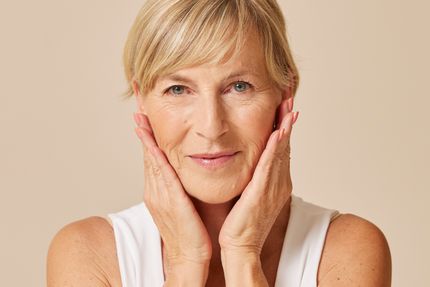Heart palpitations and menopause
Heart palpitations feel like your heart is racing, pounding or skipping beats. They can make you fear the worst, but palpitations are actually quite common and usually nothing to worry about. Heart palpitations are very common in menopausal women. So what causes these heart sensations during menopause? Why does your heart start beating faster or pounding without doing anything to cause it?

I keep having these attacks where my heart starts racing out of nowhere. It scares me to death! Thankfully, my heart rate usually goes back to normal after a few minutes. - Astrid (age 49)

Fluctuating hormones can cause symptoms like heart palpitations. So, they can start as early as perimenopause. About 40 to 50 percent of menopausal women report having heart palpitations. Some get them on a daily basis, others only occasionally. Menopause-related heart palpitations can increase heart rates by 8–16 beats per minute, sometimes even more.
They can happen even when you're resting and not doing anything at all. Although they are usually harmless, it's understandable that you're concerned or frightened. Instead of scouring the Internet for solutions, you can find reliable information and everything you need in one place on SeeMe-nopause.
What is happening in your body?
Heart palpitations feel like your heart is racing, pounding or skipping beats. They can make you fear the worst, but palpitations are actually quite common and usually nothing to worry about. So what causes these heart sensations during menopause? Why does your heart start beating faster or pounding without doing anything to cause it?
Heart palpitations can be a result of lower levels of the hormone oestrogen. Among other things, oestrogen regulates important processes in the nervous system and coronary artery, the blood vessel which supplies blood to the heart. When oestrogen levels increase, the coronary artery dilates. When oestrogens levels drop, it contracts. Fluctuating oestrogen levels can therefore cause heart palpitations.
Other causes
But also other factors and menopausal symptoms can trigger them, such as mood swings, hot flashes, stress and high blood pressure. Although heart palpitations can be worrisome, they're usually harmless and treatable.
What are the signs?
Heart palpitations feel like your heart is pounding in your chest. They can be triggered by exercise or elevated stress, but you can also get them without doing anything to cause them. For example, when you're watching TV, lying in bed or waking up in the morning. Or they can be caused by a combination of factors. Heart palpitations can also feel like your heart has skipped a beat or added an extra beat.
Heart palpitations can last seconds, minutes or longer. They usually come and go quickly, but they can also start and stop gradually. It’s also possible to have a rapid or irregular heartbeat without being aware of it. When it comes to heart palpitations, there is no ‘one beat fits all’, the symptoms are different for everyone who experiences them.
Palpitations can feel scary, so it's normal to worry or feel anxious when you have them. They trigger a distress signal in the body. Your body then enters fight-or-flight mode and releases the stress hormone cortisol, which can make palpitations worse or more frequent, or trigger other menopausal symptoms and complaints.
When to seek medical help?
Palpitations are actually quite common and usually nothing to worry about. Contact your GP immediately if heart palpitations occur with:
- Chest tightness or pain
- Shortness of breath
- Feeling faint or fainting
- Nausea
- Sudden or unusually pale skin (pallor)
If your heart palpitation are menopause related, you won’t also have the above-listed symptoms.
What can you do?
What are some things you can do to support cardiovascular health?
- Pay attention to what you eat. Proper heart muscle function is reliant on the adequate dietary intake of calcium, magnesium and sodium. Make sure your diet is healthy and varied. You can also consider taking a supplement.
- Avoid or reduce your intake of alcohol, coffee, spicy foods and sugar.
- Get plenty of rest. Anxiety and stress can trigger or worsen palpitations. Try doing breathing exercises on a regular basis or practise mindfulness to reduce stress.
- Are you aware of your heartbeat right now? Then sit down, breathe in calmly into your abdomen, breathe out, and think of something positive (like a place where you feel comfortable or a person you love). Deep breathing instantly lowers the heart rate and reduces the production of cortisol.
Your path to a smooth menopause starts here
Get the tools you need to navigate menopause with more ease and to educate yourself about your body. With tips and insights from experts, and relatable stories of women just like you. Press play, not pause.
What treatments can help?
If you are also suffering from other symptoms besides heart palpitations, then hormone therapy could be the answer you have been looking for.
Can hormone therapy help?
Hormone replacement therapy (HRT) treats symptoms of menopause by replacing lost hormones. HRT is used to relieve severe menopausal symptoms. Symptoms such as hot flashes and mood swings usually subside within a few weeks of starting HRT. Do you have heart palpitations as well as other menopausal symptoms? Then HRT might be an option for you.
Sources
- Ganga HV, Noyes A, White CM, Kluger J. (2013). Magnesium adjunctive therapy in atrial arrhythmias. PMID: 23731344.
- Mayo Clinic. (2022). Heart palpitations. https://www.mayoclinic.org/diseases-conditions/heart-palpitations/symptoms-causes/syc-20373196.
- British Health Foundation. Menopause and your heart. https://www.bhf.org.uk/informationsupport/support/women-with-a-heart-condition/menopause-and-heart-disease#sign.
- Carpenter JS, Sheng Y, Pike C, Elomba CD, Alwine JS, Chen CX, Tisdale JE. (2022). Correlates of palpitations during menopause: A scoping review. PMID: 35833667
- Amin S, M.D. Medical News Today. (2022). Heart palpitations and menopause: What you need to know. https://www.medicalnewstoday.com/articles/317700.
Tips and advice


FAQ
I suffer from palpitations. How can I get my heart rate down?
Sit down, breathe in calmly into your abdomen, breathe out, and think of something positive (like a place where you feel comfortable or a person you love). Deep breathing instantly lowers the heart rate and reduces the production of cortisol.
Who is SeeMe-nopause?
SeeMe-nopause was founded on the initiative of a group of women and is part of the eHealth Ventures Group, a leading organisation specialising in digital health solutions with platforms in 14 countries.
With a team of doctors and menopause specialists, we provide access to information and supplements. We will also offer medicinal products and therapies in the near future. Our goal is to give women the tools they need to not only survive but thrive through perimenopause and beyond. More about us.
How can SeeMe-nopause help me?
SeeMe-nopause helps you feel optimistic through menopause:
- Holistic approach to menopause: medical support, dietary supplements, nutritional tips and healthy lifestyle tips
- Online counselling by a doctor within 48 hours with online support during your treatment
- Competent, personal and with the convenience of in-home treatment.












